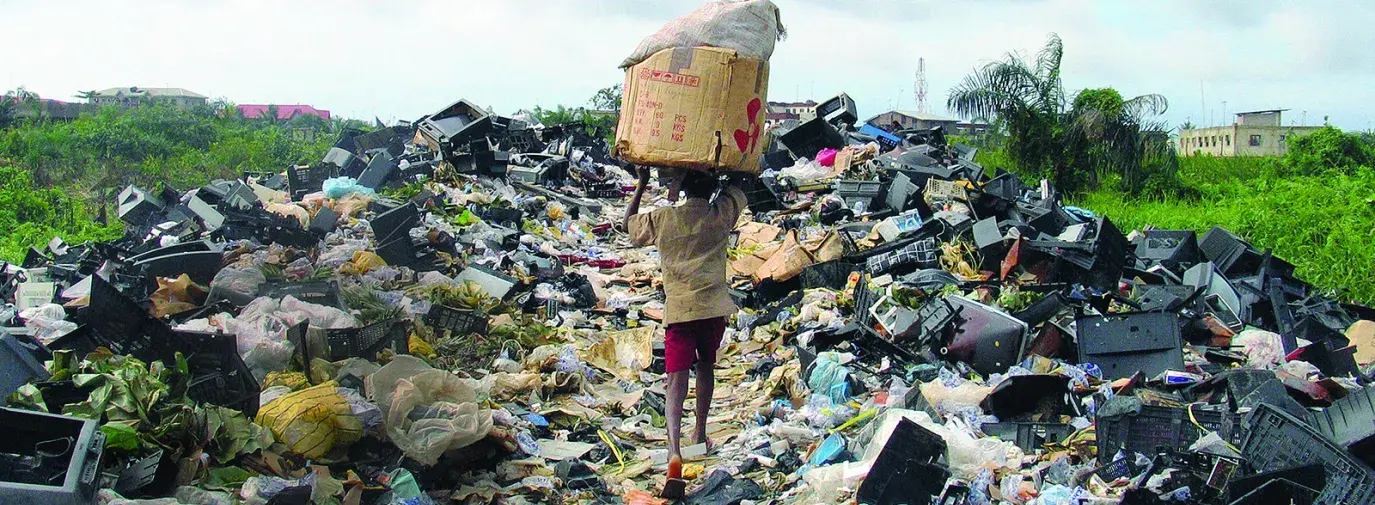
Once cell phones, laptops, or other electronics have outlived their mayfly-like lifespans, their disposal becomes an issue. Full of toxic chemicals such as lead, cadmium, mercury, chromium, and PCBs, improperly recycled electronic waste, or e-waste, can expose people to substances that lead to cancer, birth defects, and other major health issues.
According to some estimates, 50 to 80 percent of electronics collected for recycling in North America is exported to developing countries, where they’re dumped or hand-processed by workers with little to no protective gear, and release toxins at deadly levels.
“Some people in Africa, China, and India are making more money scavenging e-waste than they could otherwise, but they’re risking their lives to take it apart or burn the plastics off to recover the recyclable metals,” says Ted Smith, coordinator of the International Campaign for Responsible Technology. “High-end e-waste recyclers should know how to recover the metals without burning and exposing people to toxins, but wastepickers in developing countries don’t have the cash or the wherewithal to do it. That’s what’s creating pollution that’s just wreaking havoc in so many places.”
To reduce the likelihood of your electronics ending up in a toxic dump in Africa or Asia, pay close attention to whether and how your recycler is certified. The two main certifications in the US are R2 and e-Stewards.
R2 is the standard developed under the heavy hand of US electronics manufacturers and a scrap-recycling trade association. E-waste activists consider R2 lax and cite numerous loopholes that allow R2-certified companies to cut corners and mislead clients. For example, companies with only one R2-certified facility can act as if their entire business is “R2-certified” while still operating non-certified facilities that may ship your old electronics to developing countries.
In contrast, the robust e-Stewards certification is run by the Basel Action Network (BAN), an environmental and human rights watchdog in the area of ewaste. BAN is named after the Basel Convention, an international treaty that prevents global dumping of toxic e-waste, particularly in developing countries. The US is the only developed country that has failed to ratify the Basel Convention.
BAN regularly monitors electronics recyclers—regardless of whether they’re certified by e-Stewards—for illegal overseas waste shipments by planting electronic tracking devices in e-waste that they drop off for recycling, or by photographing containers and tracking their numbers across the ocean.
Chicago-based Intercon Solutions, an electronics recycler currently certified by R2, was caught red-handed in 2011 when a shipping container left its secure facility and arrived in Hong Kong, where authorites, alerted by BAN, found it full of contraband waste, forbidden for entry into China. Ironically, the company was applying at the time for e-Stewards certification. Needless to say, BAN rejected the company for e-Stewards certification, laying out the steps it would need to take to clean up its act.
“R2 allows exporters of e-waste to violate the decisions and global norms of the Basel Convention,” says Jim Puckett, executive director of BAN. In contrast, “e-Stewards is designed to implement the global decisions that prevent the export of toxic waste electronics from developed to developing countries. In this way, we preserve lives and good American recycling jobs.”
Green America supports recycling cell phones, computers, and other electronics through an e-Stewards recycler. Find one near you at e-stewards.org.







